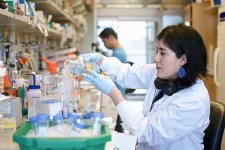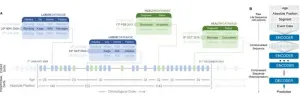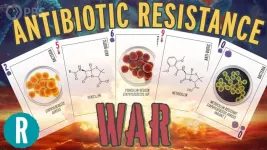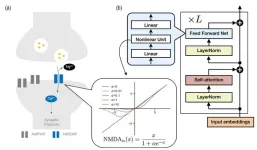(Press-News.org) How are memories consolidated during sleep? In 2021, researchers led by Dr. Thomas Schreiner, leader of the Emmy Noether junior research group at LMU’s Department of Psychology, had already shown there was a direct relationship between the emergence of certain sleep-related brain activity patterns and the reactivation of memory contents during sleep. However, it was still unclear whether these rhythms are orchestrated by a central pacemaker. So the researchers joined up with scientists from the Max Planck Institute for Human Development in Berlin and the University of Oxford to reanalyze the data. Their results have identified respiration as a potential pacemaker. “That is to say, our breathing influences how memories are consolidated during sleep,” says Schreiner.
Learning processes investigated in sleep laboratory
For their original study, the researchers showed 20 study participants 120 images over the course of two sessions. All the pictures were associated with certain words. Then the participants slept for around two hours in the sleep laboratory. When they awoke, they were questioned about the associations they had learned. During the entire learning and sleep period, their brain activity was recorded by means of EEG, along with their breathing.
The researchers discovered that previously learned contents were spontaneously reactivated by the sleeping brain during the presence of so-called slow oscillations and sleep spindles (short phases of increased brain activity). “The precision of the coupling of these sleep-related brain rhythms increases from childhood to adolescence and then declines again during aging,” says Schreiner.
Breathing and brain activity are linked
Because respiration frequency also changes with age, the researchers then analyzed the data in relation to the recorded breathing and were able to establish a connection between them: “Our results show that our breathing and the emergence of characteristic slow oscillation and spindle patterns are linked,” says Schreiner. “Although other studies had already established a connection between breathing and cognition during wake, our work makes clear that respiration is also important for memory processing during sleep.”
Older people often suffer from sleep disorders, respiratory disorders, and declining memory function. Schreiner plans to further investigate whether there are connections between these phenomena and whether interventions – such as the use of CPAP masks, which are already used to treat sleep apnea – make sense from a cognitive perspective.
END
Memory research: Breathing in sleep impacts memory processes
2023-12-18
ELSE PRESS RELEASES FROM THIS DATE:
Alexander Zholents recognized with 2023 Dieter Möhl Award
2023-12-18
Zholents was honored for his work on the theory of optical stochastic cooling.
Alexander Zholents, a senior physicist at the U.S. Department of Energy’s (DOE) Argonne National Laboratory and distinguished fellow in the Accelerator Systems division is one of the recipients of this year’s Dieter Möhl Award.
The award is presented by CERN, the European laboratory for particle physics. It is in tribute to the late Dieter Möhl, a pioneer in the realm of particle beam cooling. The awards celebrate both early career and lifetime achievements in the field of beam cooling and its applications.
“I am deeply honored to receive this award,” said Zholents. “The ...
Unraveling predisposition in bilateral Wilms tumor
2023-12-18
(Memphis, Tenn.—December 18, 2023) Children with bilateral Wilms tumor have a tumor in each of their kidneys — a condition that strongly suggests an underlying genetic or epigenetic predisposition driving the disease. Scientists at St. Jude Children’s Research Hospital gathered a large cohort of bilateral Wilms tumor samples and conducted analyses to assess which factors contribute to predisposition comprehensively. The work has implications for counseling patient families, guiding treatment decisions and informing the design of future clinical trials. The study was published today in Nature Communications.
Having tumors in ...
Feelings of impatience evolve over time, study says
2023-12-18
A new study answers a timely question: What is the hardest part of waiting? Consumers do plenty of it—online, in line, in traffic, or for deliveries. And now we know it’s the final phase that’s most problematic for them.
In this season of joyful—and not-so-joyful—anticipation, the research has deep implications for marketers and psychological insights for us all, says Annabelle Roberts, coauthor and assistant professor of marketing at the University of Texas McCombs School of Business. The paper shows:
It’s better for companies to communicate possible delays early in the wait;
It’s better for ...
Little bacterium may make big impact on rare-earth processing
2023-12-18
ITHACA, N.Y. - A tiny, hard-working bacterium – which weighs one-trillionth of a gram – may soon have a large influence on processing rare earth elements in an eco-friendly way.
In a new study, Cornell University scientists show that genetically engineering this bacterium could improve the efficiency for the purification of elements found in smartphones, computers, electric cars and wind turbines, and could even boost global economic supply chains.
Vibrio natriegens, the bacterium, offers a sustainable ...
AI generates proteins with exceptional binding strengths
2023-12-18
A new study Dec. 18 in Nature reports an AI-driven advance in biotechnology with implications for drug development, disease detection, and environmental monitoring. Scientists at the Institute for Protein Design at the University of Washington School of Medicine used software to create protein molecules that bind with exceptionally high affinity and specificity to a variety of challenging biomarkers, including human hormones. Notably, the scientists achieved the highest interaction strength ever reported between a computer-generated biomolecule and its target.
Senior author David Baker, professor of biochemistry at UW Medicine, ...
Artificial intelligence can predict events in people's lives
2023-12-18
Artificial intelligence developed to model written language can be utilized to predict events in people's lives. A research project from DTU, University of Copenhagen, ITU, and Northeastern University in the US shows that if you use large amounts of data about people's lives and train so-called 'transformer models', which (like ChatGPT) are used to process language, they can systematically organize the data and predict what will happen in a person's life and even estimate the time of death.
In a new scientific article, 'Using Sequences of Life-events to Predict Human Lives', published ...
Einstein receives $10.9 million grant to validate remote cognitive testing for Alzheimer’s and other dementias
2023-12-18
December 18, 2023—(BRONX NY)—Neurologists often diagnose Alzheimer’s disease after evaluating patients during lengthy, in-person office visits. This poses a significant challenge for many groups, particularly people with limited access to specialized care, including people from historically marginalized groups and people living in rural areas.
Albert Einstein College of Medicine has received a five-year, $10.9 million grant from the National Institutes of Health (NIH) to study whether remote neuropsychological testing can substitute for in-person office visits when assessing whether people have Alzheimer’s disease or other dementias.
“In-person ...
The antibiotic resistance war (video)
2023-12-18
WASHINGTON, Dec. 18, 2023 — There’s a microscopic battle happening right before our eyes, involving the critical issue of antibiotic resistance. Witness the historical development of antibiotics, from penicillin's accidental discovery to the ongoing battle against superbugs. https://www.youtube.com/watch?v=OCR5wFWSGlA
Reactions is a video series produced by the American Chemical Society and PBS Digital Studios. Subscribe to Reactions at http://bit.ly/ACSReactions and follow us on Twitter @ACSReactions.
The American Chemical Society (ACS) is ...
AI's memory-forming mechanism found to be strikingly similar to that of the brain
2023-12-18
An interdisciplinary team consisting of researchers from the Center for Cognition and Sociality and the Data Science Group within the Institute for Basic Science (IBS) revealed a striking similarity between the memory processing of artificial intelligence (AI) models and the hippocampus of the human brain. This new finding provides a novel perspective on memory consolidation, which is a process that transforms short-term memories into long-term ones, in AI systems.
In the race towards developing ...
15th annual horizon scan identifies 15 most pressing issues for conservation, including invertebrate decline and changing marine ecosystems
2023-12-18
Since 2009, the Cambridge Conservation Initiative has coordinated an annual horizon scan, a well-established method for predicting which threats, changes, and technologies will have the biggest impact on biological conservation in the following year. This year, the 15th horizon scan included 31 scientists, practitioners, and policymakers who developed a list of 96 issues, which they eventually narrowed down to the fifteen most novel and impactful. Their findings, publishing in the journal Trends in Evolution & Ecology ...






